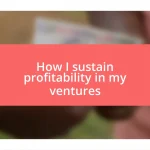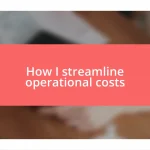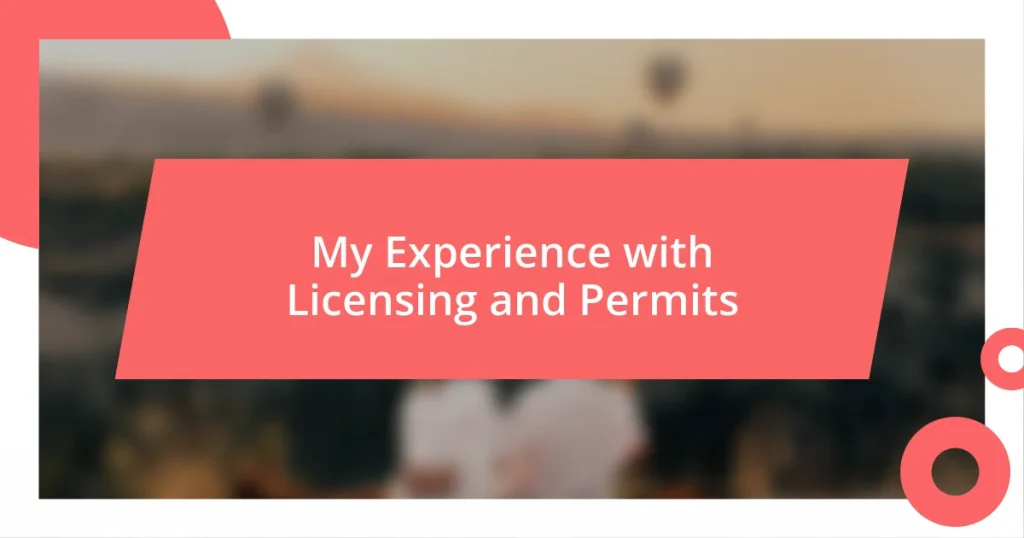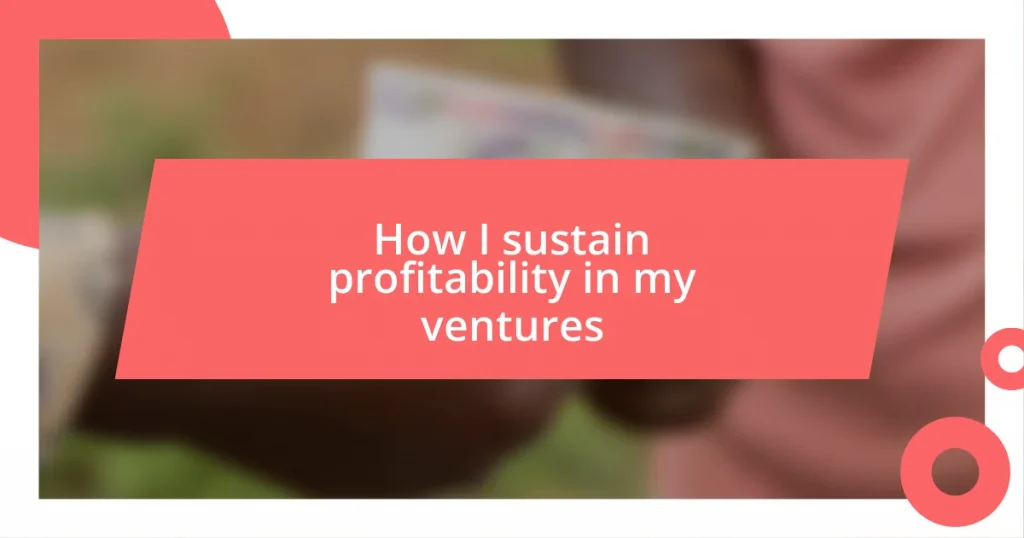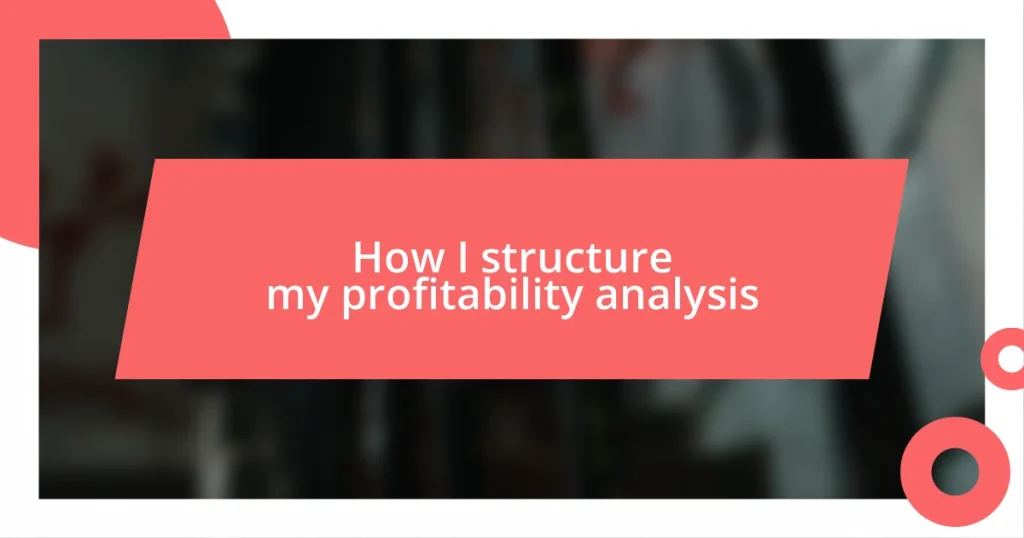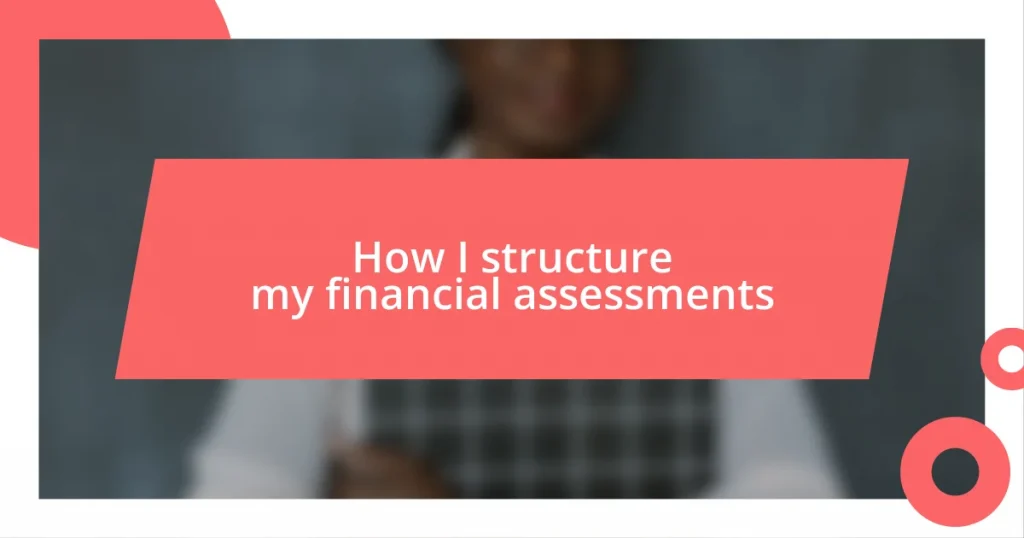Key takeaways:
- Understanding the difference between licenses (permission to operate) and permits (compliance with regulations) is vital for legal business operation.
- Licenses and permits enhance consumer trust, ensure legal compliance, and open up business opportunities through quality assurance.
- Successful navigation of the licensing process requires thorough preparation, attention to detail, and proactive communication with authorities.
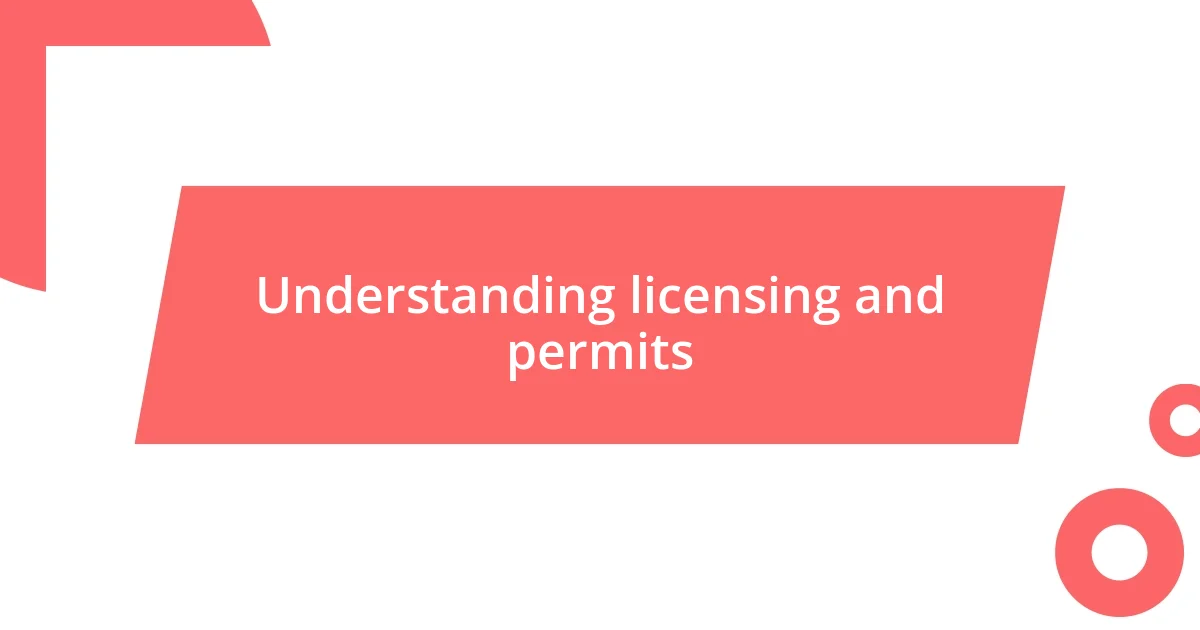
Understanding licensing and permits
Licensing and permits can feel overwhelming, can’t they? The process often seems like a maze, and I remember the first time I had to navigate it for my business. I was excited but also anxious, realizing that each license and permit held the key to operating legally and avoiding fines.
Understanding the difference between a license and a permit is crucial. A license gives you permission to engage in a specific activity, like running a restaurant, while a permit often requires compliance with local regulations, such as health inspections. When I applied for my business license, I felt a wave of relief wash over me, knowing I was one step closer to my dream, yet I quickly learned that obtaining the necessary permits wasn’t far behind.
It’s easy to see licensing as just another bureaucratic hurdle, but I’ve come to view it as a pathway to professionalism and credibility. Each stamp of approval is not just a requirement; it’s a demonstration of commitment to quality and safety. Have you ever considered how these legal formalities reflect your dedication to your customers? When I finally got my permits, it wasn’t just paperwork; it was validation of my hard work and passion.
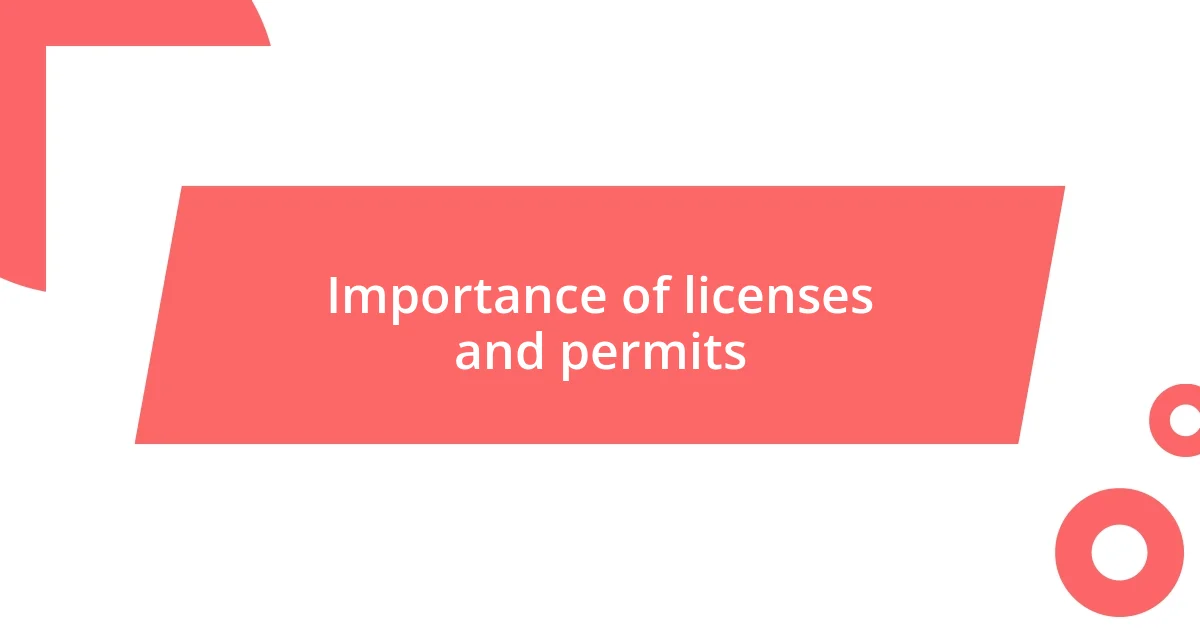
Importance of licenses and permits
Licenses and permits are not merely formalities; they serve as essential guardians of trust and responsibility in any industry. I vividly recall the moment I received my business license; it felt like holding a ticket to the real world of entrepreneurship. Each required permit, whether for health, safety, or zoning, reassured my customers that I was operating within the law, prioritizing their well-being.
Here are a few reasons why licenses and permits are crucial:
- Legal Compliance: Operating without the necessary documentation can lead to hefty fines and legal trouble.
- Consumer Trust: Having the right licenses signals to customers that you’re accountable and care about their safety.
- Business Opportunities: Many contracts and partnerships require proof of proper licenses, limiting your potential market if you don’t have them.
- Quality Assurance: The process of obtaining permits often involves inspections that assure quality standards are being met.
Reflecting on my journey, I realize how essential these formalities were to building the foundation of my business. Without them, I would have been left vulnerable and unprepared, fighting to regain my footing.
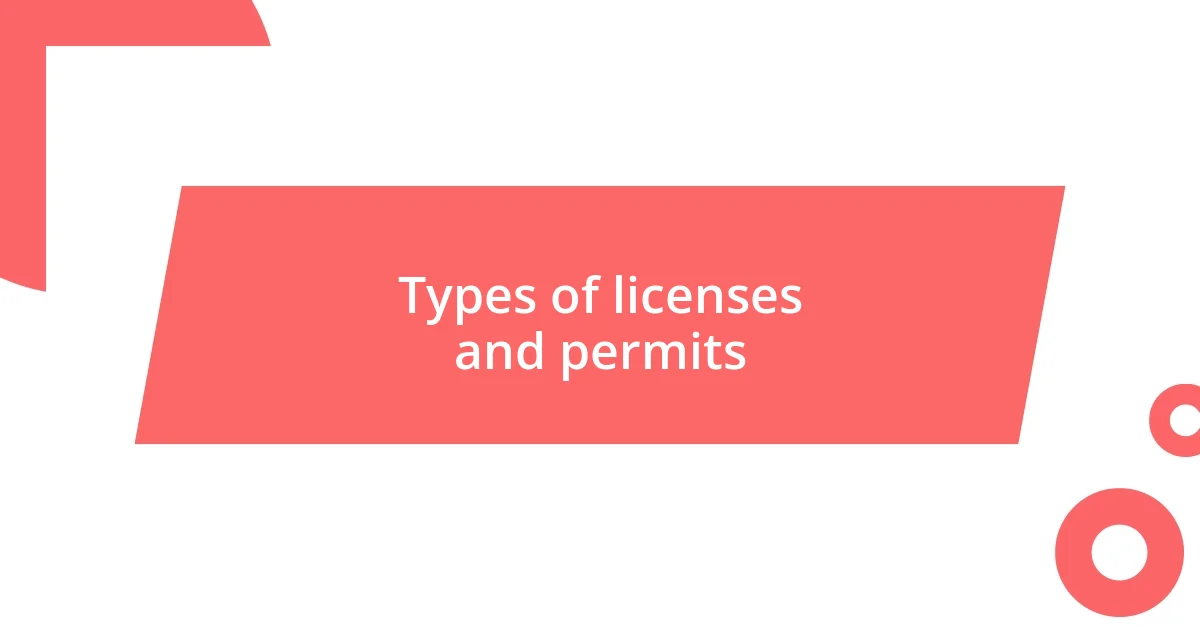
Types of licenses and permits
Licenses and permits come in various types, each serving its unique purpose. For instance, a business license grants the authority to operate commercially, while specialized permits may address specific activities, such as selling alcohol or operating heavy machinery. I remember applying for a liquor license for my restaurant; the process was meticulous and required extensive documentation, but I viewed it as a necessary step to ensure responsible service.
Moreover, local regulations can dictate the types of permits required, making it essential to research what’s applicable to your area. Health permits, for example, ensure compliance with safety standards and can involve inspections from health authorities. I often reflect on my first health inspection; nerves were high as I prepared my staff, but the knowledge that we were committed to food safety made me proud.
Finally, it’s interesting to note that some licenses are temporary or conditional, depending on the nature of the business. A seasonal license can be invaluable. For instance, if you operate a food truck during summer festivals, obtaining a temporary food service permit allows for compliance without long-term commitments. Each type of license or permit tells a story of dedication, responsibility, and a commitment to quality.
| Type | Description |
|---|---|
| Business License | General authorization to operate a business. |
| Health Permit | Certification confirming compliance with health regulations. |
| Liquor License | Permit to sell alcoholic beverages. |
| Temporary Permit | Short-term authorization, often for events or seasonal operations. |
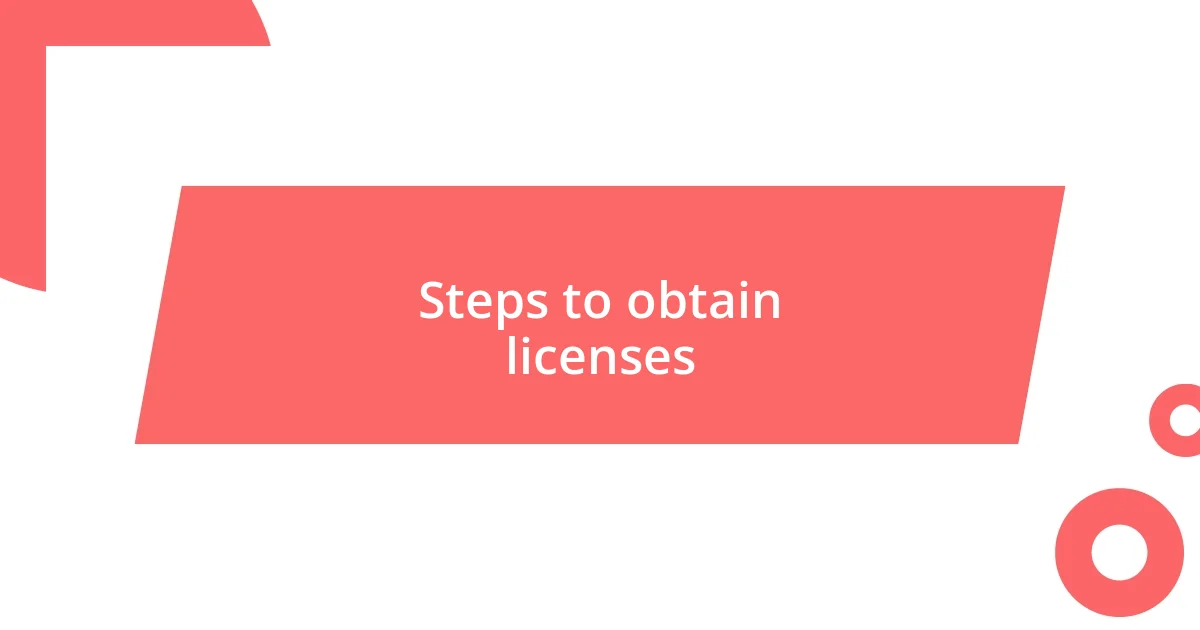
Steps to obtain licenses
To embark on the journey of obtaining a license, the first step is to research the specific requirements relevant to your industry and locality. I remember anxiously browsing through various websites, feeling somewhat overwhelmed with the intricacies involved. It’s crucial to make a checklist, as this keeps things organized and ensures you don’t overlook any vital steps.
Once you’ve gathered all the necessary information, the next phase is to fill out the application forms. At first, the forms seemed daunting, like a maze with no exit. But taking it one question at a time not only simplified the process but also provided clarity. I often found myself pausing, reflecting on how each detail mattered—these weren’t just bureaucratic hurdles, but stepping stones towards achieving my goals.
After submission, the waiting game begins, which can be quite nerve-wracking. When I submitted my liquor license application, I could hardly focus on anything else. Would I receive approval? I learned to be patient, knowing that good things often take time. It’s a process, but each notification you receive brings you closer to the finish line. Don’t forget to stay engaged; follow up if necessary, as proactive communication can sometimes expedite the process.
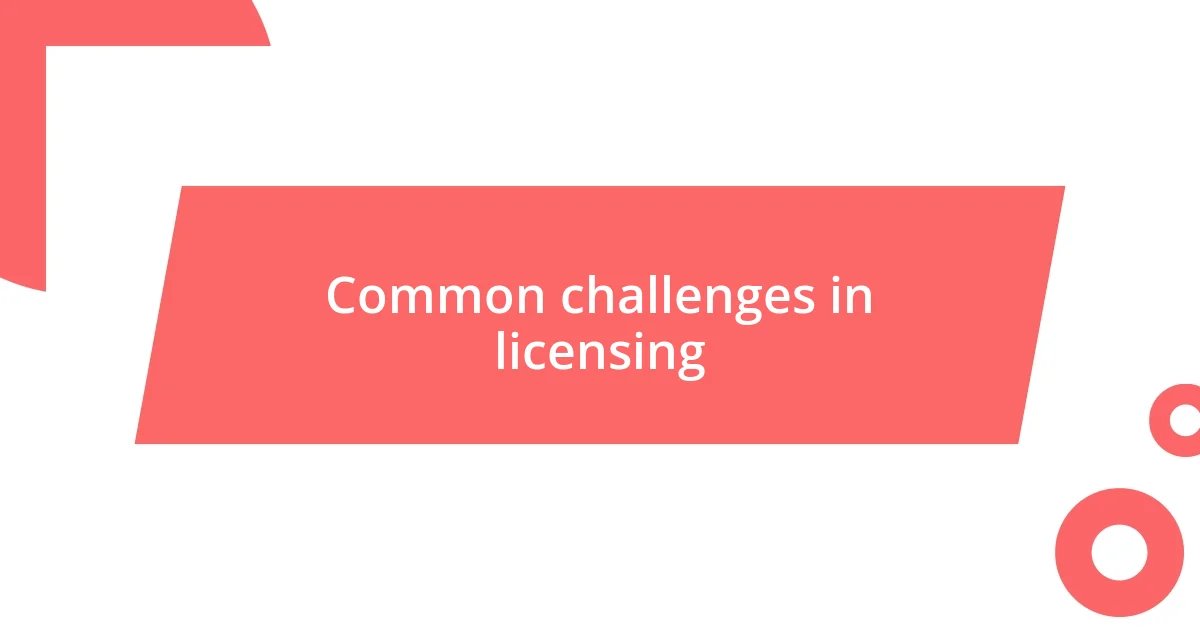
Common challenges in licensing
Navigating the licensing process can often feel like wandering through a maze—one wrong turn and you could be facing unexpected setbacks. I vividly remember the frustration when I incorrectly submitted my business license application, causing delays that seemed unbearable. It’s so easy to misinterpret requirements or miss a critical document. Have you ever felt overwhelmed by bureaucracy? I certainly have, and I learned that meticulous attention to detail is key to overcoming these initial hurdles.
Another common challenge stems from the ever-changing regulations and compliance standards. I once thought I had everything figured out for my health permit, but updates to local health codes threw me for a loop. It was a crash course in staying informed about your industry. Staying on top of changes can be daunting, but it’s essential for avoiding fines or complications. Don’t underestimate the power of reaching out to local agencies for guidance; they often appreciate the engagement and can provide real-time insights.
Lastly, the timeline for approvals can be unpredictable, and this uncertainty can be truly nerve-wracking. While waiting for my liquor license, I constantly questioned whether I’d be ready for the busy season. Would the delay impact my restaurant’s success? Validating these worries, I realized the importance of having contingency plans in place. A proactive approach can alleviate some of the stress, giving you peace of mind during those agonizing waiting periods. Have you thought about what you’d do if faced with similar delays? In my experience, planning for uncertainties can turn potential roadblocks into manageable bumps in the road.

Tips for successful applications
It’s often tempting to rush through the application process, but taking your time is crucial. I once rushed to submit my application for a new business license, thinking speed would benefit me. Instead, I found myself scrambling to correct multiple mistakes that could have easily been avoided. What if I’d taken a step back to thoroughly review everything? In hindsight, I’d recommend reading through the application multiple times and even having someone else review it. A fresh pair of eyes can catch things you might miss.
Engaging directly with the authorities can also make a world of difference. I remember feeling frustrated when waiting for a response to my construction permit application. So, I decided to pick up the phone and reach out to the office directly. Surprisingly, the representative was incredibly helpful, guiding me through the particulars and even alerting me to new requirements. Have you ever considered that a simple conversation could clarify complex processes? It truly changed my perspective and streamlined my experience immensely.
Lastly, don’t underestimate the power of supporting documentation. I learned this the hard way when applying for my environmental permit. Initially, I provided minimal evidence, thinking it was sufficient. However, once I added detailed project plans and photographs, everything changed. The approval process sped up significantly. Ask yourself, are you providing every bit of relevant information that might aid your case? In my journey, thoroughness became my best ally and a game changer in securing timely approvals.
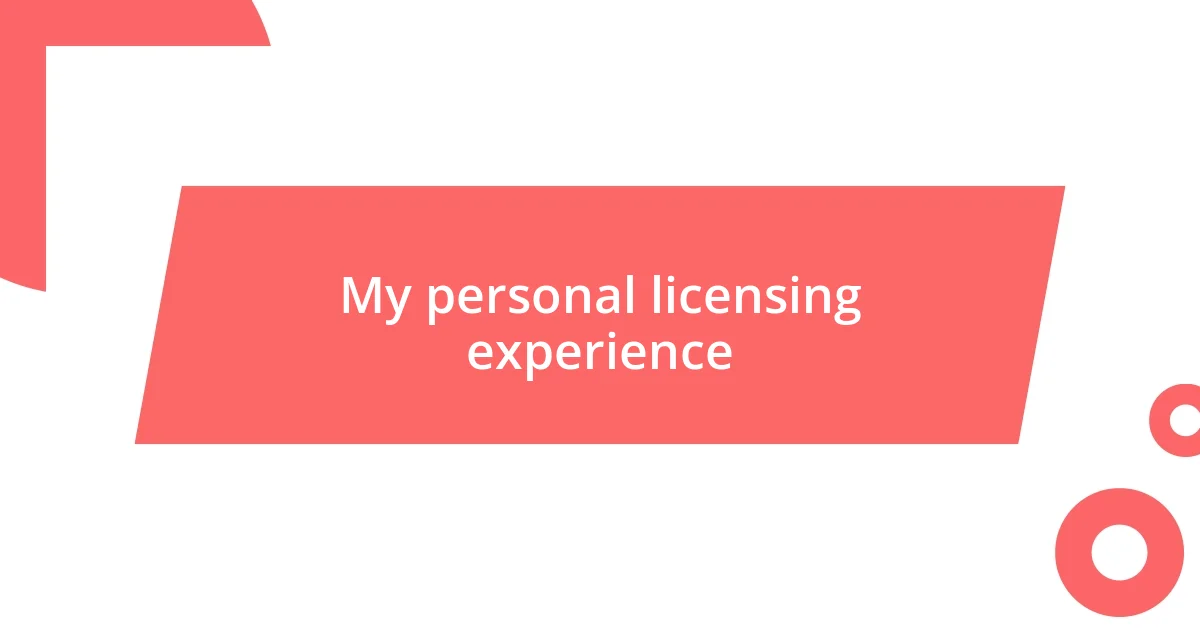
My personal licensing experience
Navigating the licensing landscape was a journey filled with unexpected lessons for me. I remember one instance where I felt the weight of uncertainty pressing down as I waited for my contractor’s license. Each day felt like an eternity, and I found myself replaying every detail of my application in my mind, worrying if I had done enough. Did I provide all the documentation? What if they’d overlooked my submission? Those anxious moments brought home the reality of how important preparation really is.
Reflecting on my experiences, I can’t help but chuckle at how naive I was about timelines. When I first applied for my trade license, I truly thought I could breeze through it in a weekend. Little did I know, it turned into a month-long saga. I was juggling phone calls and emails, feeling a mix of frustration and determination. Have you ever faced a delay that caught you off guard? In those moments, I learned that persistence and a patient mindset are essential allies.
Looking back, I feel like my licensing trials were really a rite of passage. A particularly memorable challenge was securing my food service license. The bureaucratic hurdles felt overwhelming, and I vividly recall my initial reaction—panic mixed with disbelief. However, as I sought help and delved deeper into the fine print, I started to see the process as a puzzle rather than an obstacle. It transformed my mindset and taught me that every setback could be reframed as an opportunity for growth. What about you? Have you turned challenges into stepping stones on your own journey?
